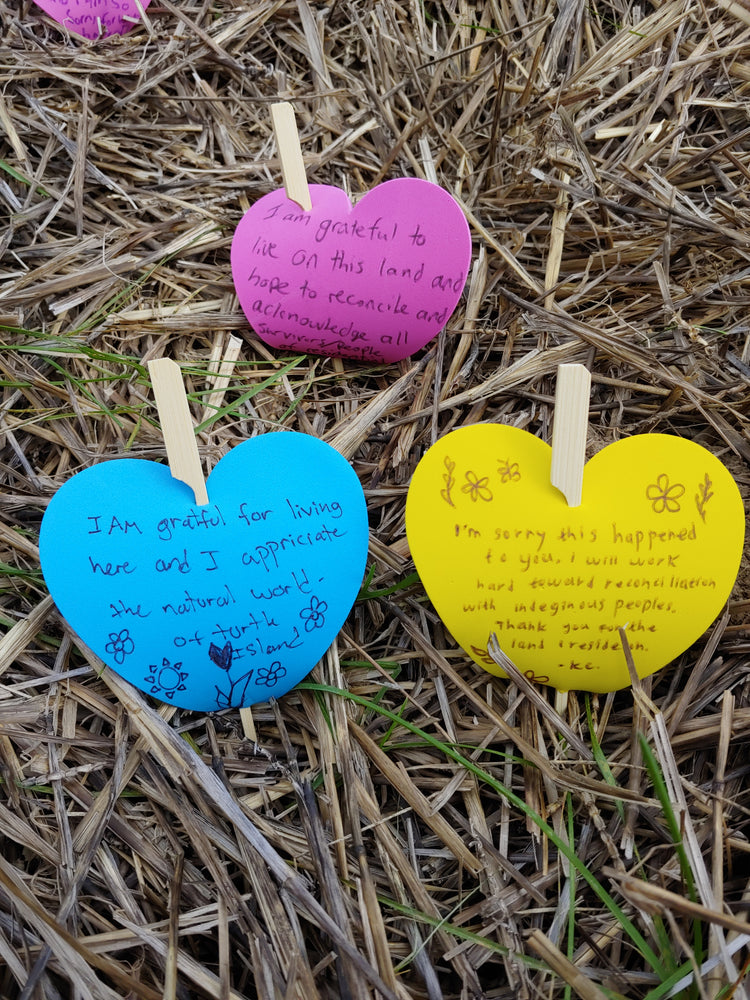I recently retired from my job as the teacher-librarian at Kingston Secondary School and Module Vanier. As part of my work at that school I started and ran a club named by its student participants, the Sweetgrass Circle. Our purpose was to provide opportunities for members of our school community to come into relationship with their non-human kin using Indigenous Ways of Knowing to guide us. We partnered with the Environment Club to use what we learned to try to bring multi-species justice to our school.
“Multispecies justice is about understanding that humans, other animals, trees, rivers, soil, and more are interdependent, and all depend on the viability of ecological systems. It means challenging the traditional western view that human success will be won through neglecting and exploiting other beings’ interests, needs, or viability.” -David Schlosberg, University of Sydney
After our move from Kingston Collegiate and Vocational Institute to our new school, Kingston Secondary, our first action was to plant a pollinator garden outside the library at the front of the school. Our good friend, mentor and fellow co-founder of Little Forests Kingston, Maureen Buchannan, member of the Batchawan First Nation, taught us that this is an act of decolonization, the land acknowledgement embodied. We are returning this small piece of land, to the Plants that call this place home. We registered the garden as a Heart Garden . It continues to be an important site of KSS' Reconciliation efforts.
“...planting gardens offers lessons on working for reconciliation. Like planting a garden, taking part in reconciliation takes ongoing attention and learning. The garden represents reconciliation; a garden is alive and requires our collective care and commitment to prosper. Both are places where knowledge and action meet, where we honour the past, and prepare for the future." -First Nations Child and Family Caring Society

Robin Wall Kimmerer, member of the Citizen Potawatami Nation, offers us the lessons of the Honourable Harvest, an Indigenous protocol that reminds us that we are deeply connected to all our non-human kin who freely offer us their gifts.
"To name the world as gift is to feel one’s membership in the web of reciprocity. It makes you happy—and it makes you accountable. Conceiving of something as a gift changes your relationship to it in a profound way...you are responsible for it, and your gratitude has motive force in the world. You’re likely to take much better care of the gift...I imagine if we acknowledged that everything we consume is the gift of Mother Earth, we would take better care of what we are given." -Robin Wall Kimmerer, in "The Serviceberry"
Students in Tim Cross' grade 9 Science class were offered an opportunity to get to know one of our new garden members. We took our cue from Robin Wall Kimmerer and asked these questions about the plant they choose to explore with the intention of braiding Indigenous and Western Science;
- Who are you? What should I call you?
- Why are you here?
- What are your gifts and responsibilities? What have you brought us?
- Who is in your family? With whom are you related?
- What do you need from me? How can I help you?
- Who do you dream of becoming?
It strikes me that these questions are good ones for all of us to answer but especially for youth who strive to find their place in the world. Here are links to some of the students' work;
Blanket Flower Branched Coneflower Sweetgrass Wild Onion Wild Bergamot
These students along with others from Karen Irvine's Grade 11 Biology class, were some of the young people who spent a day at the Hwy 15 Indigenous Food Sovereignty site planting one of LFK's first Little Forests. After these experiences, many of them expressed their feelings about their fears for their future in a rapidly warming world and their hopes that efforts like those of LFK might have to impact that future positively. They will take these ideas, these reframings and the actions they have inspired with them and it will shape their future actions. In fact, one KSS graduate and former Sweetgrass Circle member, Robert Macleod, has started Little Forests McGill.
by Joanne Whitfield



